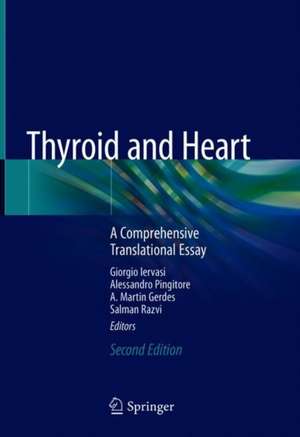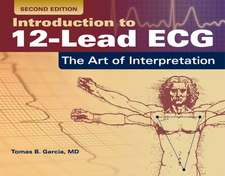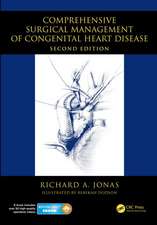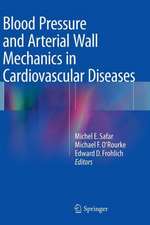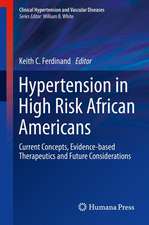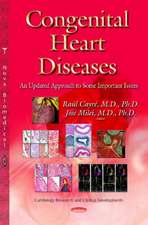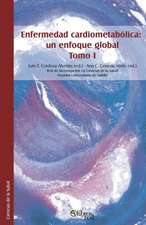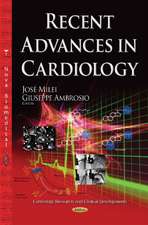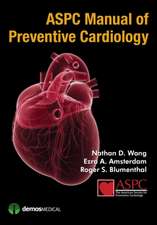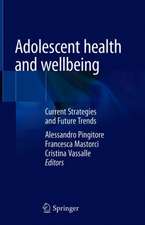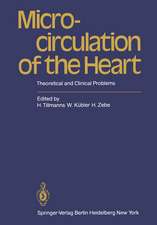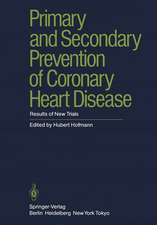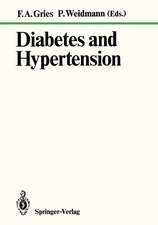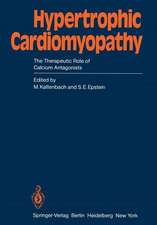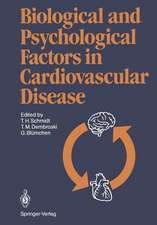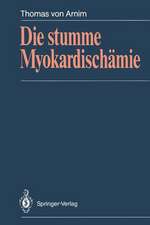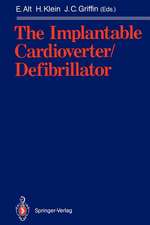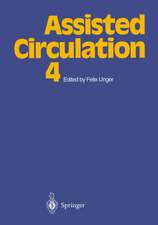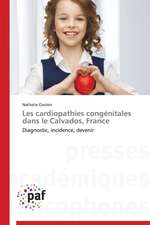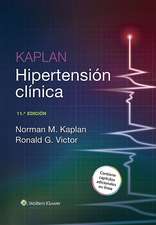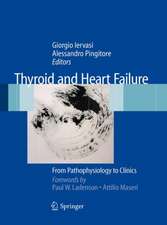Thyroid and Heart: A Comprehensive Translational Essay
Editat de Giorgio Iervasi, Alessandro Pingitore, A.Martin Gerdes, Salman Razvien Limba Engleză Hardback – 20 mar 2020
This second edition of Thyroid and Heart failure provides a careful and updated review of the experimental, clinical and epidemiological results in the field of TH and heart failure, with a particular focus on the translational - bench to bedside - significance of the obtained results. It discusses topics such as the molecular, structural, functional, cellular and histological cardiac changes; the reversibility of these changes with TH replacement therapy; the systemic effects – kidney, hormonal pathways systems, brain, muscle, etc – of altered TH metabolism in HF, as well as the clinical and prognostic implications. The section devoted to the potential therapeutic treatments has been expanded.
Thanks to its translational approach to this highly complex subject, the book will be of interest to a broad readership, including cardiologists, endocrinologists and internists.
| Toate formatele și edițiile | Preț | Express |
|---|---|---|
| Paperback (1) | 566.70 lei 38-44 zile | |
| Springer International Publishing – 20 mar 2021 | 566.70 lei 38-44 zile | |
| Hardback (1) | 737.32 lei 22-36 zile | |
| Springer International Publishing – 20 mar 2020 | 737.32 lei 22-36 zile |
Preț: 737.32 lei
Preț vechi: 776.13 lei
-5% Nou
Puncte Express: 1106
Preț estimativ în valută:
141.08€ • 147.70$ • 116.74£
141.08€ • 147.70$ • 116.74£
Carte disponibilă
Livrare economică 17-31 martie
Preluare comenzi: 021 569.72.76
Specificații
ISBN-13: 9783030368708
ISBN-10: 303036870X
Pagini: 436
Ilustrații: XIII, 436 p. 63 illus., 43 illus. in color.
Dimensiuni: 178 x 254 mm
Greutate: 0.95 kg
Ediția:2nd ed. 2020
Editura: Springer International Publishing
Colecția Springer
Locul publicării:Cham, Switzerland
ISBN-10: 303036870X
Pagini: 436
Ilustrații: XIII, 436 p. 63 illus., 43 illus. in color.
Dimensiuni: 178 x 254 mm
Greutate: 0.95 kg
Ediția:2nd ed. 2020
Editura: Springer International Publishing
Colecția Springer
Locul publicării:Cham, Switzerland
Cuprins
I Heart Failure and thyroid dysfunction: General Aspects.- 1 Thyroid heart interaction: hystorical perspectives .- 2 Epidemiology of Heart Failure.- 3 Heart Failure, overt and subclinical thyroid dysfunction.- 4 Thyroid, Heart Failure and Cardioprotection .- II Heart and Thyroid in Normal and Failed Heart: Basic Aspect.- 5 Mechanism of Action of TH on the Cardiovascular System.- 6 Novel insights into the machinery controlling the cellular response to TH.- 7 Thyroid Hormone Receptor Signaling .- 8 Thyroid Hormone Deiodinative pathways in the normal and Failing Heart.- 9 3-Iodothyronamine mediated TH Metabolism in the Normal and Failing Heart.- 10 Cardiac Myocyte and Vascular Remodeling in altered and normalized TH metabolism.- 11 Thyroid Hormone and Mithocondrial Function and Protection in Normal and Failing Heart TH-Linked Epigenetic Factors in Heart Failure.- 12 TH-Linked Genetic Expression in Heart Failure.- III Heart Failure and Thyroid in clinics.- 13 Thyroid and CardiovascularRisk.- 14 TH abnormalities and systolic and diastolic function.- 15 Heart Failure Drugs and influences on TH Metabolism.- 16 The complex relationship between TH, Kidney and Heart.- 17 TH, Brain and Heart.- 18 Thyroid, Heart Failure and Neuroendocrine Activation.- 19 Thyroid, Heart Failure, oxidative stress and inflammation.- IV TH Treatment in Cardiac Disorders: Current and new perspectives.- 20 Thyroid hormone modalities of administration vs blood and tissue levels.- 21 TH treatment in patients with cardiac disorders: general aspects.- 22 TH analogs in Heart Failure: from the past to new perspectives.- 23 TH Treatment in AMI.- 23 TH Treatment in HF.- 24 TH Treatment in non-HF cardiac disorders.- 25 New approaches to normalize TH profile in HF
Notă biografică
Giorgio Iervasi is Director of the CNR Institute of Clinical Physiology (IFC). He received his MD from the University of Pisa. In 1998, he was named Chief of Cardiovascular Endocrine Research and the Clinical Physiology Unit, and from 2007 of the G. Monasterio Foundation, CNR, Tuscany Region. His research is focused on the cardio-endocrine metabolic area; special attentions has been devoted in the last 15-20 years to the understanding of the pathogenic role and clinical implications of mild thyroid dysfunction in cardiac disorders, particularly low T3 syndrome as a biomarker of poor prognosis and as a crucial contributing factor of disease mechanisms favouring the progression of heart failure. He is the coeditor of the first edition of Thyroid and Heart failure. In 2003, he received the “Featured Article of the Month” award from the AEHA International Society for his paper on low T3 syndrome in heart failure.
Alessandro Pingitore graduated in Medicine and Surgery, and received a PhD in Cardiovascular Physiopathology and a postdoctoral qualification in Cardiovascular Disease. He is currently a permanent scientist at the CNR Institute of Clinical Physiology. His main research fields are the assessment of cardiac function and morphology using non-invasive cardiac imaging, the relationship between thyroid hormone and the heart, and the physiological response to strenuous physical stress in normal or extreme environments.
Martin A. Gerdes is Professor of Medicine and Department Chair. In his early career he developed accurate methods to evaluate myocyte remodelling to better understand the relationship between myocyte shape and cardiac function during physiological and pathological growth of the heart. He discovered that changes in myocyte length and width correlate with changes in chamber circumference and wall thickness respectively and that the increase in chamber diameter/wall thickness ratio with progression to dilated heart failure is due to excessive myocyte lengthening from series addition of sarcomeres with no change in myocyte diameter.
SALMAN RAZVI is a senior lecturer in Endocrinology at Newcastle University and a consultant endocrinologist at Queen Elizabeth Hospital. His doctoral thesis was based on assessing cardiovascular risk in subclinical hypothyroidism. Subsequent to this, he has continued to pursue research evaluating the action of thyroid hormones particularly on the cardiovascular system. The focus of his research has been on investigating the association between thyroid function and cardiovascular events in various populations. He is the chief investigator of several projects funded by various statutory funding bodies as well as charities. He has authored more than 70 peer-reviewed publications, mainly relating to thyroid dysfunction.
Alessandro Pingitore graduated in Medicine and Surgery, and received a PhD in Cardiovascular Physiopathology and a postdoctoral qualification in Cardiovascular Disease. He is currently a permanent scientist at the CNR Institute of Clinical Physiology. His main research fields are the assessment of cardiac function and morphology using non-invasive cardiac imaging, the relationship between thyroid hormone and the heart, and the physiological response to strenuous physical stress in normal or extreme environments.
Martin A. Gerdes is Professor of Medicine and Department Chair. In his early career he developed accurate methods to evaluate myocyte remodelling to better understand the relationship between myocyte shape and cardiac function during physiological and pathological growth of the heart. He discovered that changes in myocyte length and width correlate with changes in chamber circumference and wall thickness respectively and that the increase in chamber diameter/wall thickness ratio with progression to dilated heart failure is due to excessive myocyte lengthening from series addition of sarcomeres with no change in myocyte diameter.
SALMAN RAZVI is a senior lecturer in Endocrinology at Newcastle University and a consultant endocrinologist at Queen Elizabeth Hospital. His doctoral thesis was based on assessing cardiovascular risk in subclinical hypothyroidism. Subsequent to this, he has continued to pursue research evaluating the action of thyroid hormones particularly on the cardiovascular system. The focus of his research has been on investigating the association between thyroid function and cardiovascular events in various populations. He is the chief investigator of several projects funded by various statutory funding bodies as well as charities. He has authored more than 70 peer-reviewed publications, mainly relating to thyroid dysfunction.
Textul de pe ultima copertă
In recent years, several scientific papers have highlighted the role of the thyroid system in cardioprotection, and several clinical studies – including multicenter studies – have identified the role of thyroid hormones (TH) in the development and progression of cardiovascular disease, making an update of TH and heart relationship both necessary and timely.
This second edition of Thyroid and Heart failure provides a careful and updated review of the experimental, clinical and epidemiological results in the field of TH and heart failure, with a particular focus on the translational - bench to bedside - significance of the obtained results. It discusses topics such as the molecular, structural, functional, cellular and histological cardiac changes; the reversibility of these changes with TH replacement therapy; the systemic effects – kidney, hormonal pathways systems, brain, muscle, etc – of altered TH metabolism in HF, as well as the clinical and prognostic implications. The section devoted to the potential therapeutic treatments has been expanded.
Thanks to its translational approach to this highly complex subject, the book will be of interest to a broad readership, including cardiologists, endocrinologists and internists.
This second edition of Thyroid and Heart failure provides a careful and updated review of the experimental, clinical and epidemiological results in the field of TH and heart failure, with a particular focus on the translational - bench to bedside - significance of the obtained results. It discusses topics such as the molecular, structural, functional, cellular and histological cardiac changes; the reversibility of these changes with TH replacement therapy; the systemic effects – kidney, hormonal pathways systems, brain, muscle, etc – of altered TH metabolism in HF, as well as the clinical and prognostic implications. The section devoted to the potential therapeutic treatments has been expanded.
Thanks to its translational approach to this highly complex subject, the book will be of interest to a broad readership, including cardiologists, endocrinologists and internists.
Caracteristici
Explains thyroid hormone alteration in heart failure Discusses the topic of thyroid and heart failure, from experimental to clinical settings Presents a translational approach for clinics, with potential new strategies for treatment of heart failure
